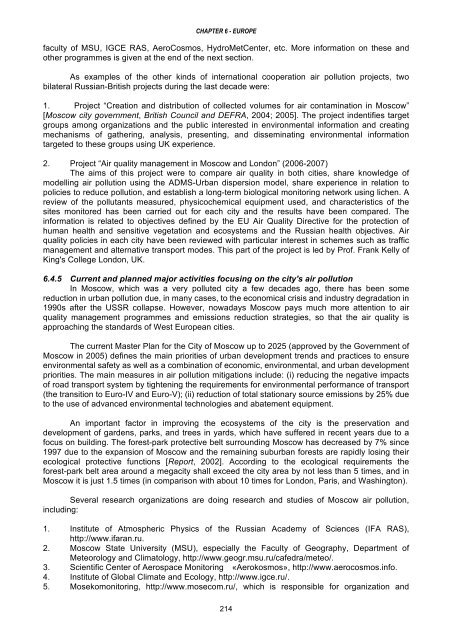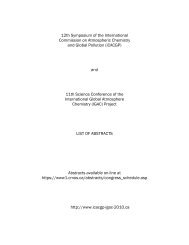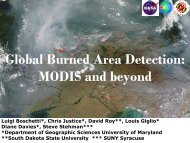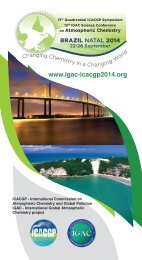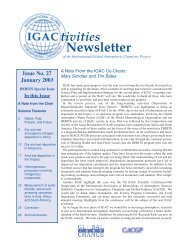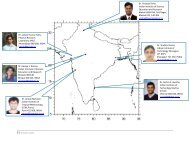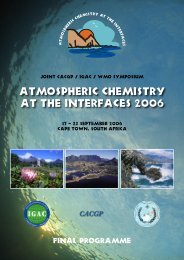GAW Report No. 205 - IGAC Project
GAW Report No. 205 - IGAC Project
GAW Report No. 205 - IGAC Project
- No tags were found...
Create successful ePaper yourself
Turn your PDF publications into a flip-book with our unique Google optimized e-Paper software.
CHAPTER 6 - EUROPEfaculty of MSU, IGCE RAS, AeroCosmos, HydroMetCenter, etc. More information on these andother programmes is given at the end of the next section.As examples of the other kinds of international cooperation air pollution projects, twobilateral Russian-British projects during the last decade were:1. <strong>Project</strong> “Creation and distribution of collected volumes for air contamination in Moscow”[Moscow city government, British Council and DEFRA, 2004; 2005]. The project indentifies targetgroups among organizations and the public interested in environmental information and creatingmechanisms of gathering, analysis, presenting, and disseminating environmental informationtargeted to these groups using UK experience.2. <strong>Project</strong> “Air quality management in Moscow and London” (2006-2007)The aims of this project were to compare air quality in both cities, share knowledge ofmodelling air pollution using the ADMS-Urban dispersion model, share experience in relation topolicies to reduce pollution, and establish a long-term biological monitoring network using lichen. Areview of the pollutants measured, physicochemical equipment used, and characteristics of thesites monitored has been carried out for each city and the results have been compared. Theinformation is related to objectives defined by the EU Air Quality Directive for the protection ofhuman health and sensitive vegetation and ecosystems and the Russian health objectives. Airquality policies in each city have been reviewed with particular interest in schemes such as trafficmanagement and alternative transport modes. This part of the project is led by Prof. Frank Kelly ofKing's College London, UK.6.4.5 Current and planned major activities focusing on the city's air pollutionIn Moscow, which was a very polluted city a few decades ago, there has been somereduction in urban pollution due, in many cases, to the economical crisis and industry degradation in1990s after the USSR collapse. However, nowadays Moscow pays much more attention to airquality management programmes and emissions reduction strategies, so that the air quality isapproaching the standards of West European cities.The current Master Plan for the City of Moscow up to 2025 (approved by the Government ofMoscow in 2005) defines the main priorities of urban development trends and practices to ensureenvironmental safety as well as a combination of economic, environmental, and urban developmentpriorities. The main measures in air pollution mitigations include: (i) reducing the negative impactsof road transport system by tightening the requirements for environmental performance of transport(the transition to Euro-IV and Euro-V); (ii) reduction of total stationary source emissions by 25% dueto the use of advanced environmental technologies and abatement equipment.An important factor in improving the ecosystems of the city is the preservation anddevelopment of gardens, parks, and trees in yards, which have suffered in recent years due to afocus on building. The forest-park protective belt surrounding Moscow has decreased by 7% since1997 due to the expansion of Moscow and the remaining suburban forests are rapidly losing theirecological protective functions [<strong>Report</strong>, 2002]. According to the ecological requirements theforest-park belt area around a megacity shall exceed the city area by not less than 5 times, and inMoscow it is just 1.5 times (in comparison with about 10 times for London, Paris, and Washington).Several research organizations are doing research and studies of Moscow air pollution,including:1. Institute of Atmospheric Physics of the Russian Academy of Sciences (IFA RAS),http://www.ifaran.ru.2. Moscow State University (MSU), especially the Faculty of Geography, Department ofMeteorology and Climatology, http://www.geogr.msu.ru/cafedra/meteo/.3. Scientific Center of Aerospace Monitoring «Aerokosmos», http://www.aerocosmos.info.4. Institute of Global Climate and Ecology, http://www.igce.ru/.5. Mosekomonitoring, http://www.mosecom.ru/, which is responsible for organization and214


